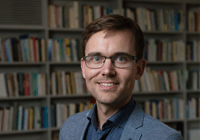
Photo credits:
Lars Wallin
SCAS News - 10 September, 2019
Reflections by a Fellow - Terje Falck-Ytter
A Bridge Between Faculties
"I am studying brain and behavioral development in children, focusing particularly on the early
development in children with autism. This means that my research profile is somewhat different
from the majority of the fellows at SCAS, who traditionally come from the humanities/social
sciences,
but currently also via the relatively new Natural Sciences program.
Two of my former colleagues in residence (Anders Hillborg and Steve Chenoweth) have recently
described many of the general aspects of SCAS that make it such a truly inspiring and unique institute.
I completely agree with “the previous speakers” in this regard. Here, I will reflect briefly and more
specifically on some potential advantages and disadvantages of being in this middle position between
the humanities/social sciences and the natural sciences during a year in residence at SCAS.
One clear advantage is that interacting with fellows in both “camps” may be directly relevant for
one’s own work. For example, sociological perspectives on social exchange is of direct relevance
for my research on autism – which is defined by difficulties with social interaction. Further, one of
the most rewarding experiences during my year at SCAS was a collaborative project with literary
scholar
and SCAS-fellow Sofia Lodén about autism in medieval literature. At the same time, autism
is highly
heritable,
and understanding the genetic roots of the condition is crucial. Therefore, it has
been really useful for me to discuss aspects of my work with evolutionary biologists/geneticists too.
Most topics studied by the other fellows have been relatively far from my own research, but this is
probably
the experience of many fellows (and such an interdisciplinary mix is indeed one of the core
components of
a center for advanced study!). For me, who has spent the last ten years or so focusing
on specific research
projects within psychology, the year in residence at SCAS has been a very educative
and mind-stretching
experience. It has been amazing to see how very good discussions always emerge
following the seminars,
despite, or perhaps because of, this broad variety in background. Not only has
it been interesting to learn
about the content of the other fellows’ research, but also about the great
variation in the university world(s)
around the globe.
I encourage SCAS to continue to accept fellows in the psychology/medical science area to strengthen
this gap-filling function. A challenge, however, is that many research projects in psychology and medicine
are empirical
studies with high and continuous demands on resources and management. In my case, I am
leading studies of
children’s development, involving several researchers and research assistants. Although
one can delegate many
tasks to others to prepare for a year away, it is impossible to delegate everything.
This entails that unlike people
who have a more theoretical approach, to some extent I need to keep two
worlds active at the same time: the
peaceful and thoughtful world at SCAS and, the more hectic and unpre-
dictable world “back home”. This
switching exercise can be challenging at times. I must say though that
the leadership and staff at SCAS have
always been very supportive and helpful; on several occasions I have
had colleagues and students over for
meetings (my home institute happens to be nearby). On one occasion,
my group spent a whole day at SCAS,
and the combination of the beautiful surroundings and the hospitality
and service-mindedness of the staff made
this an unforgettable day for everyone present."
Terje Falck-Ytter is a SCAS Pro Futura Scienta Fellow; Professor of Psychology, Uppsala
University; and Senior Researcher, Karolinska Institutet, Stockholm. He was in residence
at
the Collegium in the academic year 2018-19.
Read more about Terje Falck-Ytter >>






